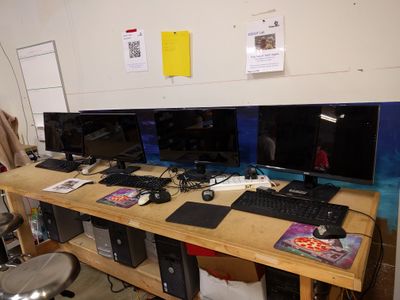Difference between revisions of "ESS IoT"
Jump to navigation
Jump to search
Keith.hughes (talk | contribs) |
Keith.hughes (talk | contribs) |
||
| Line 6: | Line 6: | ||
Some examples of what IoT is used for would be: | Some examples of what IoT is used for would be: | ||
| + | * Using a device like the Ninja Block and its range of add-on sensors you can track if a water pipe has burst in your basement, if there is motion inside your home while you are away, and have it automatically send you a notification by email or text message when it happens. | ||
| + | * Whether taking care of a small hydroponic system or a large backyard lawn, systems like HarvestGeek with their suite of sensors and web connectivity help save you time and resources by keeping plants fed based on their actual growing needs and conditions while automating much of the labor processes. | ||
| + | * Web enabled lights like the Phillip's Hue can be used as an ambient data displays (Glow red when my bus is 5 minutes away). These multi-functional lights can also help you to reduce electricity use (automatically turn off the lights when no one is in a room) or help to secure your home while you are away by turning your lights on and off. | ||
| + | |||
| + | These examples and many more can be found here [[https://www.postscapes.com/internet-of-things-examples/]] | ||
This shop is for working on projects that use embedded computing environments (small microcontrollers, Raspberry Pis, Arduinos, Teensies, that sort of thing) and sensors that connect to resources over computer networks. We have both resources for you to work on projects and classes to help you learn what you need to do to design and implement your own ESS/IoT projects. | This shop is for working on projects that use embedded computing environments (small microcontrollers, Raspberry Pis, Arduinos, Teensies, that sort of thing) and sensors that connect to resources over computer networks. We have both resources for you to work on projects and classes to help you learn what you need to do to design and implement your own ESS/IoT projects. | ||
Revision as of 21:53, 15 June 2017
Welcome to the ESS/IoT Shop at TinkerMill.
ESS stands for Embedded Systems and Sensors. We like that name better than IoT (Internet of Things), but IoT is the more familiar term.
Some examples of what IoT is used for would be:
- Using a device like the Ninja Block and its range of add-on sensors you can track if a water pipe has burst in your basement, if there is motion inside your home while you are away, and have it automatically send you a notification by email or text message when it happens.
- Whether taking care of a small hydroponic system or a large backyard lawn, systems like HarvestGeek with their suite of sensors and web connectivity help save you time and resources by keeping plants fed based on their actual growing needs and conditions while automating much of the labor processes.
- Web enabled lights like the Phillip's Hue can be used as an ambient data displays (Glow red when my bus is 5 minutes away). These multi-functional lights can also help you to reduce electricity use (automatically turn off the lights when no one is in a room) or help to secure your home while you are away by turning your lights on and off.
These examples and many more can be found here [[1]]
This shop is for working on projects that use embedded computing environments (small microcontrollers, Raspberry Pis, Arduinos, Teensies, that sort of thing) and sensors that connect to resources over computer networks. We have both resources for you to work on projects and classes to help you learn what you need to do to design and implement your own ESS/IoT projects.
Resources
- Tools and Software available at the ESS/IoT Shop
- A description of the ESS/IoT classes at Tinkermill
- The Drive folder that contains many class resources is found [here].
- Some external resources helpful for ESS/IoT projects
